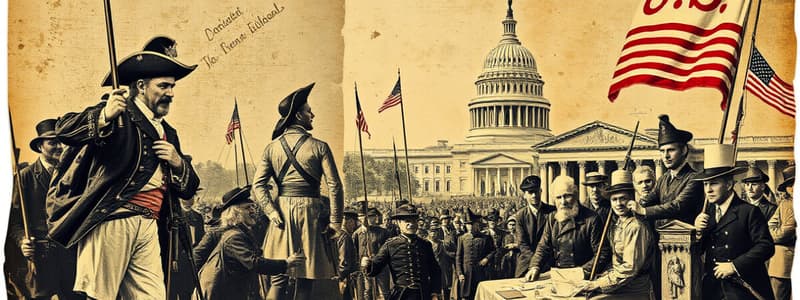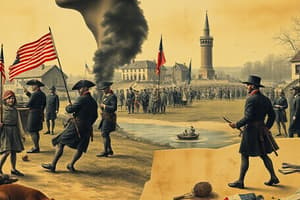Podcast
Questions and Answers
What was one of the primary economic motives for European colonization of North America?
What was one of the primary economic motives for European colonization of North America?
- Fur trade (correct)
- Scientific exploration
- Religious freedom
- Cultural exchange
Which of the following events directly led to the Declaration of Independence?
Which of the following events directly led to the Declaration of Independence?
- French and Indian War
- Treaty of Paris
- Boston Tea Party (correct)
- Boston Massacre
What document served as the first governing framework for the United States?
What document served as the first governing framework for the United States?
- Declaration of Independence
- Articles of Confederation (correct)
- Bill of Rights
- U.S. Constitution
What ideology justified westward expansion during the 19th century?
What ideology justified westward expansion during the 19th century?
Which amendment abolished slavery in the United States?
Which amendment abolished slavery in the United States?
What was a significant challenge during the Reconstruction era?
What was a significant challenge during the Reconstruction era?
Which act was passed to address civil rights during Reconstruction?
Which act was passed to address civil rights during Reconstruction?
What was a major consequence of the Civil War?
What was a major consequence of the Civil War?
Study Notes
Pre-Colonial and Colonial Period
- Indigenous Peoples: Diverse cultures and societies existed long before European arrival, including tribes like the Iroquois, Sioux, and Navajo.
- European Exploration: Initiated by figures like Columbus (1492), leading to European claims over North America.
- Colonization:
- Spanish, French, and English established settlements.
- Jamestown (1607) was the first permanent English colony.
- Economic motives: fur trade, agriculture, and exploitation of resources.
American Revolution (1775-1783)
- Causes: Taxation without representation, British military actions, and Enlightenment ideas.
- Key Events: Boston Tea Party (1773), Declaration of Independence (1776).
- Outcome: Treaty of Paris (1783) recognized U.S. independence.
Formation of Government
- Articles of Confederation: First governing document; weaknesses led to ineffective governance.
- Constitution (1787): Established a stronger federal framework; includes checks and balances.
- Bill of Rights (1791): First ten amendments guaranteeing individual liberties.
19th Century Developments
- Westward Expansion: Manifest Destiny ideology; Louisiana Purchase (1803) and Oregon Trail.
- Civil War (1861-1865): Causes included slavery, states' rights, and economic differences.
- Key events: Emancipation Proclamation (1863), Gettysburg (1863).
- Outcome: Union victory; abolition of slavery (13th Amendment, 1865).
Reconstruction (1865-1877)
- Goals: Reintegration of Southern states and addressing rights of freed slaves.
- Challenges: Racial tensions, economic instability, and resistance from Southern states.
- Legislation: Civil Rights Act (1866), 14th and 15th Amendments.
Industrialization and Immigration (Late 19th Century)
- Economic Growth: Rise of industries, railroads, and urbanization.
- Immigration Waves: Increased populations from Europe and Asia; Ellis Island (1892) as a key entry point.
20th Century Events
- World Wars:
- WWI (1914-1918): U.S. involvement starts in 1917; Treaty of Versailles (1919).
- WWII (1939-1945): Major global conflict; U.S. enters post-Pearl Harbor (1941).
- Civil Rights Movement (1950s-1960s): Fight against racial segregation and discrimination; key figures include Martin Luther King Jr. and Rosa Parks.
Contemporary History
- Cold War Era (1947-1991): Tensions with the Soviet Union; includes the Korean War, Vietnam War, and the Space Race.
- Post-Cold War: Economic globalization, technological advancements, and the rise of terrorism.
- Recent Developments: Political polarization, climate change discussions, and social movements for equality and justice.
Pre-Colonial and Colonial Period
- Indigenous peoples comprised various tribes, including the Iroquois, Sioux, and Navajo, each with distinct cultures prior to European contact.
- European exploration launched in 1492 by Columbus led to widespread claims over North America by European powers.
- Colonization efforts by Spain, France, and England resulted in established settlements, with Jamestown (1607) marking the first permanent English colony.
- Economic interests drove colonization efforts, focusing on the fur trade, agriculture, and resource exploitation.
American Revolution (1775-1783)
- The Revolution was fueled by colonial grievances such as taxation without representation, British military actions, and the influence of Enlightenment philosophies.
- Significant events included the Boston Tea Party (1773) and the Declaration of Independence (1776), pivotal in galvanizing public support for independence.
- The Treaty of Paris (1783) officially recognized U.S. independence, ending the conflict.
Formation of Government
- The Articles of Confederation served as the first governing document but exhibited significant weaknesses, leading to poor governance.
- The Constitution of 1787 established a robust federal structure, incorporating checks and balances to limit governmental power.
- The Bill of Rights (1791) included the first ten amendments, ensuring the protection of individual liberties, such as freedom of speech and religion.
19th Century Developments
- Westward expansion was driven by the ideology of Manifest Destiny, exemplified by the Louisiana Purchase (1803) and the migration along the Oregon Trail.
- The Civil War (1861-1865) arose from tensions over slavery, states' rights, and economic disparities, marked by pivotal moments like the Emancipation Proclamation (1863) and the Battle of Gettysburg (1863).
- The Union's victory culminated in the abolition of slavery through the 13th Amendment (1865).
Reconstruction (1865-1877)
- Reconstruction aimed to reintegrate Southern states into the Union and promote rights for freed slaves.
- This period faced significant obstacles, including racial tensions and economic difficulties, alongside resistance from Southern populations.
- Key legislative measures included the Civil Rights Act (1866), and the 14th and 15th Amendments, which aimed to secure civil rights and voting protections.
Industrialization and Immigration (Late 19th Century)
- The late 19th century witnessed rapid economic growth fueled by industrialization and the expansion of railroad networks, contributing to urbanization.
- Immigration surged during this period, particularly from Europe and Asia, with Ellis Island (1892) becoming a critical entry point for newcomers.
20th Century Events
- World War I (1914-1918) saw U.S. involvement beginning in 1917, leading to the signing of the Treaty of Versailles (1919) post-war.
- World War II (1939-1945) emerged as a major conflict, with U.S. entry following the attack on Pearl Harbor in 1941.
- The Civil Rights Movement during the 1950s and 1960s fought against racial segregation; pivotal leaders included Martin Luther King Jr. and Rosa Parks.
Contemporary History
- The Cold War (1947-1991) was marked by geopolitical tensions with the Soviet Union, encompassing conflicts like the Korean and Vietnam Wars, as well as the Space Race.
- The post-Cold War era featured economic globalization, advancements in technology, and a shift in security challenges, including terrorism.
- Recent developments highlight increasing political polarization, ongoing debates about climate change, and rising social movements advocating for equality and justice.
Studying That Suits You
Use AI to generate personalized quizzes and flashcards to suit your learning preferences.
Description
Explore the rich history of America from the diverse Indigenous cultures before European contact to the pivotal events of the American Revolution. This quiz touches on European exploration, colonization, and the formation of the U.S. government through the Articles of Confederation and the Constitution. Test your knowledge on these key historical events and figures.




